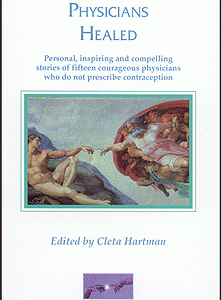By Fr William Gardner
Source: Fr. W. M. Gardner, “NFP and married life,” HPR, Jan., 2010, pp 61-65
While discussing the economic challenges in raising children one secular radio show host commented wryly: “There are ways to avoid having children: You can not do sex… or you can not do real sex… or there is abortion.” Abortion is never a legitimate choice, recent American jurisprudence and Machiavellian politics notwithstanding. However, the implication that contraceptive sex does not qualify as “real” sex merits favorable attention.
We might ask though: If a Catholic had called into the program and attempted to explain that there is a fourth way to avoid having children; namely, the use of the Natural Family Planning (NFP), would the host and the listeners recognize the difference between NFP and not doing “real” sex? I suspect that the difference would elude many listeners. Furthermore, it would be a tough sell, and perhaps rightly so (1).
In this article I wish to affirm that the practice of periodic continence, which is the lynch-pin of NFP, does not represent the ideal way of married life. There is something deficient in the practice of having sexual intercourse exclusively during the infertile times of the women’s cycle. To illustrate this deficiency I wish to examine two analogies that attempt to explain the moral justification of periodic continence. Then I will conclude with a caution about promoting NFP as an ideal, or normal, way of married life.
Avoiding Unruly Children
According to the first analogy, engaging in sexual intercourse exclusively during the infertile times as proposed by NFP for avoiding conception is like having friends (a married couple) whose children misbehave and are unruly. And so, to avoid the unpleasantness of being around the children, you choose to visit your friends exclusively after the children have gone to bed.
Interestingly, this analogy seems to betray a certain stuffiness, or lack of real love for children, whom we should love despite their unpleasantness, but still lead to excellence through example and discipline. But, moreover, this analogy fails to explain the intrinsic and inherent relationship between having sexual relations and procreation. Even though the children are a living reflection of their parents’ character and personality, visiting one’s friends is not intrinsically or inherently related to visiting their children at the same time; whereas marital relations and procreation do share an inseparable link.
A Promise Implied
Another more helpful analogy is found in Janet Smith’s well reasoned article regarding the illicitness of married couples using condoms to prevent infection by AIDS (2). The purpose of the analogy is to explain both the moral permissibility of periodic continence, which she identifies as the “acts of sexual intercourse governed by the principles of natural family planning,” and the illicitness of contraception.
Parents who say to their children, “We will do what we can to establish a savings account to help pay your college expenses,” who set up an account and eventually make and deposit enough money to do so were speaking the truth (these are like the fertile who bear children); those who spoke the same words and who set up an account but did not make enough money to do so in spite of their best efforts were also speaking the truth (these are like the infertile who would like to have children). Again, a contrast with contraceptive acts is illuminating: those who contracept are like parents who set up the account but who because they spend their money selfishly do not deposit enough money to provide much help at all. Let us extend the analysis to acts of intercourse governed by the principles of natural family planning (NFP): those who are using NFP to confine their acts of sexual intercourse to the infertile period still “speak” the language of openness to children although they have judged that it is not best for them to have a child at this time (they don’t spend selfishly any money that could be used for college education but they do take advantage of some free tickets to the movies!). They have not altered the essential potency of their acts. Contraceptors, on the other hand, most emphatically and directly attempt to remove the creative power from their acts of sexual intercourse (3).
In this analogy the act of sexual intercourse is likened to the promise made by the parents to their children to set up a savings account for college expenses. First, fruitfulness in sexual intercourse is likened to the successful establishment of an account, which is sufficient to fund the college expenses. Second, non-fruitfulness due to infertility is likened to the unsuccessful establishment of such an account. However, this lack of success is not culpable because the parents presumably saved to the best of their ability. Third, non-fruitfulness due to contraceptive sex is likened to parents who fail to establish a sufficient account because they selfishly spend their money (for example, on the movies).
Reneging on the Promise
In other words, the couple by entering into sexual intercourse seem to be making a promise that is essentially implied in such an act; namely, to be open to the life-giving power of sexual loving. But the couple who use contraception belie their intention to keep that very promise. They are pursuing the unitive aspect of sexual intercourse, with its associated pleasure, while rejecting the procreative aspect. Presumably, in the analogy, the selfish parents are pursuing the movies (or other forms of entertainment) in place of the fulfillment of the promise made to their children to establish a savings account for college expenses; thereby reneging on the promise to their children.
The evil of contraception, therefore, seems to reside in the reneging of the promise that is inherent in the use of sexual relations by deliberately impairing or destroying one’s procreative power. This promise is understood through examination of the nature of the act, whose author is the Creator Himself. Such an offense against bodily integrity coupled with the intention to frustrate the procreative end is always sinful. Couples who use contraceptive drugs, devices, or substances, even if they have just cause for avoiding pregnancy, are like the couples (in the analogy) who spend money selfishly; instead of keeping their promise to save money for their children’s college expenses.
It is interesting to note that common sense (or common decency) seems to indicate that there is something impure or dishonest about contraception. Prayerful reflection might lead one to acknowledge that the use of contraceptives is a kind of “cheating,” or a practice that renders sexual relations empty and devoid of a higher meaning. This realization seems to point to a third party involved in the arena of sexual relations; namely the Creator Himself, to whom certain basic obligations are owed. The malice of contraceptive devices, drugs, or surgeries resides in the willful and unjust use of sexual relations with respect to God, one’s spouse, one’s posterity, and one’s ancestors by suppressing or destroying the fertility of one or both spouses (4).
Conversely, according to Smith, NFP couples, though also intent on not having children, do not renege on the commitment of openness to children since “they have not altered the essential potency of their acts.” Those who use periodic continence have not destroyed the procreative potential of either or both spouses, even though they have not achieved the fullness of the procreative meaning (5).
A Variation on this Analogy
Could the analogy be slightly adjusted? Perhaps marriage is more properly likened to the promise of the parents to save for their children’s college expenses, while the marital embrace is more likened to the parents actually sending their children to college; that is, a kind of consummation of the promise. In this new analogy, the couple who has sexual relations exclusively during the infertile times is rather like the couple who sends their children to college knowing full well that there is not enough money in the savings (6). While the contracepting couple does the same, but after having spent the money foolishly that could have been used for their children’s college expenses. Whereas, the couple who merely happen to be infertile at the time sexual relations occur is like the couple who send their children to college, but the children are denied admission for insufficient grades, or some other reason beyond the control of the parents.
A Positive Duty
Returning, though, to the original analogy we might ask: Does it logically follow that if the parents have not spent their money foolishly that they have thereby fulfilled their promise to save for their children’s college expenses? Or rather, does fulfilling their promise also necessarily include a positive effort to earn and save the necessary funds, over and above an effort to avoid selfish expenditures on frivolous activities?
Indeed, in order to fulfill that promise, parents may have to sacrifice one or two legitimate (that is, non-selfish) expenses in order to achieve their generous and lofty goal. Thus, if a couple spent all their time seeking free movies, though not spending money selfishly, they still could be faulted for not fulfilling their promise to their children. Spending the money selfishly would clearly be blameworthy. But it seems that failing to save adequately because of not positively taking the necessary steps to fulfill the promise could also be blameworthy.
It seems, likewise, that NFP couples who exclusively restrict their sexual relations to the infertile times are, in a way, also in danger of incurring blame with regard to their positive marital duty. They pursue the pleasure and benefits of sexual loving in such a way that their acts will be effectively sterile. Sexual acts that are consummated during infertile periods exclusively will be sterile acts. Here I think Janet Smith’s assertion that NFP couples do not alter the essential intrinsic potency of their sexual acts (7) misses the point that such acts are, in fact, sterile because of the couples’ way of use of conjugal rights. These couples may be in danger of not fulfilling their promise to the Creator not because they intervened to suppress or destroy the fertility of either or both spouses, but rather because they were not sufficiently open to the purpose of human sexual loving, which cannot arrive at its full perfection without conception (8).
NFP not the Normal Way of Married Life
I would like to suggest that priests should be cautious in promoting NFP (which is clearly licit by virtue of recent Church teaching) as a way of life for married couples, because of this aforementioned danger. To carry Janet Smith’s analogy further, if one were truly interested in inspiring parents to fulfill their promise to establish sufficient savings for their children for college expenses, he should try to sell the benefits of a college education in ways that would justify the positive sacrifices needed by the parents. Merely convincing the parents to avoid selfish spending may not be sufficient to the task of helping the parents to fulfill their promise honestly.
Likewise, merely convincing married couples that contraception is to be avoided may not be sufficient to the task of helping them to be generously open to the gift of children in marriage, a fortiori if and when deliberately sterile acts of sexual intercourse are presented as a kind of ideal of marital loving. Instead, the main thrust of Catholic teaching and preaching about marriage and sexual loving should always focus on the goodness of children and the blessings of faithful, stable, and child-rich families. This, in turn, will be a truly Catholic (that is, inclusive and expansive) means of evangelization, both within the household of faith, and for those potentially “who enter” (cfr. Lk, 11: 9).
God’s Arm not to be Shortened
Ralph Martin includes a relevant quote from St. Bernard in his book, The Fulfillment of All Desire. In responding to the over-strict, non-biblical restrictions on who could marry, St. Bernard paraphrased Isaiah:
Why do you shorten God’s arm (Is. 59:1)? Why do you limit the abundant blessings of marriage?(9)
I wonder if the same accusation can be made against those who widely promote NFP as the normal way of married life, rather than a practice that should only be used rarely, or in extraordinary circumstances. NFP (which is fundamentally, periodic continence) shortens the creative arm of the Lord, who came that men “might have life and have it more abundantly” (Jn. 10:10). Accordingly, one married man describes NFP as a tool among many in the couples’ toolbox of solutions to various marital difficulties; a tool to be brought out only in rare situations and for serious reasons. In other words, NFP is a permissible, but not an ideal or normal, way of living married life.
Endnotes
- It would be interesting to study the history of the proponents of periodic continence to limit family size. For example, apparently Mani approved of periodic abstinence along with contraception for certain of his adherents, as a way of tolerating marriage despite his heretical view of the material world and procreation, cfr. The Fulfillment of All Desire, by Ralph Martin, (Emmaus Road Publishing, Steubenville, OH 2006), p. 27.
- “The Morality of Condom Use by HIV-Infected Spouses,” The Thomist, 70 (2006): pp. 27-69.
- Smith, pp. 42-43.
- One could speak of a culture of selfishness, “a culture which refuses to acknowledge an obligation to the past or a responsibility to the future – a culture which views the family as optional, faith as an impediment to human happiness, and personal gratification as the only measure of a life-well lived.” Cfr. speech by Don Feder, World Congress of Families Communications Director, at March for Life Rose Dinner, January 22, 2009: (http:/www.lifesitenews.com/ldn/2009/jan/09012611.html).
- Smith, p. 43.
- Fr. J. Visser, C.SS.R. acknowledged this problematic aspect of periodic continence in his article: “Periodic Continence,” in Problemi di vita coniugale [Problems in Conjugal Life], (Rome: Sales, 1955), pp. 184-197. Fr. Visser noted that periodic continence intends the union of two ends: a positive use of conjugal rights together with the negative will of avoiding procreation. Interestingly, he seems to imply that these two ends are contradictory. Nevertheless, Fr. Visser goes on to defend the licitness of periodic continence for a just cause, but he concluded that it is of itself an abnormal way of matrimonial life [“la continenza periodica é in sé un sistema di vita matrimoniale anormale.”]
- Smith, p. 43.
- cfr. my article: “A Theology of Life Giving,” HPR, Aug/Sept, 2007, pp. 68-73.
- Martin, The Fulfillment of All Desire, p. 274.






